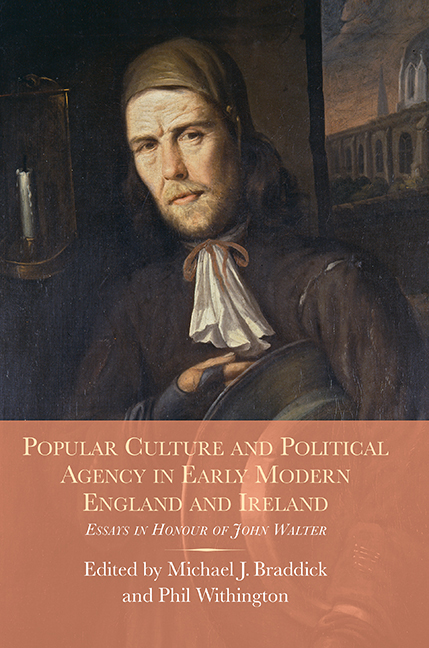 Popular Culture and Political Agency in Early Modern England and Ireland
Popular Culture and Political Agency in Early Modern England and Ireland Book contents
- Frontmatter
- Contents
- List of Illustrations
- List of Contributors
- Acknowledgements
- List of Abbreviations
- Introduction
- 1 John Walter and the social history of early modern England
- 2 Contrasting susceptibility to famine in early fourteenth- and late sixteenth-century England: the significance of late medieval rural social structural and village governmental changes
- 3 The politics of English political economy in the 1620s
- 4 Provision, household management and the moral authority of wives and mothers in early modern England
- 5 Popular senses of past time: dating events in the North Country, 1615–1631
- 6 Spectral lordship, popular memory and the boggart of Towneley Hall
- 7 Self-image and public image in the career of a Jacobean magistrate: Sir John Newdigate in the Court of Star Chamber
- 8 Gender, agency and religious change in early Stuart England
- 9 ‘A Standard which can never fail us’: the Golden Rule and the construction of a public transcript in early modern England
- 10 Religion, anti-popery and corruption
- 11 An ‘Aristotelian moment’: democracy in early modern England
- 12 John Lilburne and political agency in revolutionary England
- 13 An Irish Protestation? Oaths and the Confederation of Kilkenny
- 14 ‘Whereat his wife tooke great greef & died’: dying of sorrow and killing in anger in seventeenth-century Ireland
- Bibliography for John Walter
- Index
- Tabula Gratulatoria
- Miscellaneous Endmatter
1 - John Walter and the social history of early modern England
Published online by Cambridge University Press: 09 May 2017
- Frontmatter
- Contents
- List of Illustrations
- List of Contributors
- Acknowledgements
- List of Abbreviations
- Introduction
- 1 John Walter and the social history of early modern England
- 2 Contrasting susceptibility to famine in early fourteenth- and late sixteenth-century England: the significance of late medieval rural social structural and village governmental changes
- 3 The politics of English political economy in the 1620s
- 4 Provision, household management and the moral authority of wives and mothers in early modern England
- 5 Popular senses of past time: dating events in the North Country, 1615–1631
- 6 Spectral lordship, popular memory and the boggart of Towneley Hall
- 7 Self-image and public image in the career of a Jacobean magistrate: Sir John Newdigate in the Court of Star Chamber
- 8 Gender, agency and religious change in early Stuart England
- 9 ‘A Standard which can never fail us’: the Golden Rule and the construction of a public transcript in early modern England
- 10 Religion, anti-popery and corruption
- 11 An ‘Aristotelian moment’: democracy in early modern England
- 12 John Lilburne and political agency in revolutionary England
- 13 An Irish Protestation? Oaths and the Confederation of Kilkenny
- 14 ‘Whereat his wife tooke great greef & died’: dying of sorrow and killing in anger in seventeenth-century Ireland
- Bibliography for John Walter
- Index
- Tabula Gratulatoria
- Miscellaneous Endmatter
Summary
My qualifications for appraising John Walter's distinguished contributions to the history of early modern England are very limited. I have never made a detailed study of a riot or a popular demonstration, let alone attempted a piece of microhistory based on that exceptional range and depth of archival investigation which characterises everything that John undertakes. Moreover, his work, though intensely individual, is also recognisably part of a larger common enterprise in which the other contributors to this book have played a notable part, not just in their own publications, but in frequent meetings at conferences and collaborations in collective volumes. Together, they have, as has been rightly said, created ‘a uniquely subtle body of work on social relations’ in early modern England. So I feel something of an outsider, intruding upon an intense discussion between close colleagues.
Like all of us, John Walter is a creature of his time and place. In one of his articles, he describes himself as a ‘fresh-off-the-council-estate eleven-plus scholarship boy’. This shameless bid for street credibility is also a reminder that the enormous wave of ‘history from below’, which has been so prominent in the last fifty years, is closely connected to a marked change during the same period in the social origins of the historical profession. When Charles Firth, in his inaugural lecture in 1904 as Oxford's Regius professor of history, proposed that the syllabus should be revised in order to make it better fitted for the production of professional historians, the Oxford history tutors protested that most of their pupils had no desire to become historians and that anyway they lacked the necessary private means. It was assumed in those days that historians had to be well-to-do persons, capable of meeting out of their own pockets the costs of travel and of employing devils to transcribe documents. A hundred years later the situation is very different. In the mid twentieth century, the flourishing of the grammar schools, the public funding of university fees and maintenance, and the greater readiness of Oxford and Cambridge to broaden their social intake opened up academic careers to a much wider range of talents, female as well as male.
- Type
- Chapter
- Information
- Popular Culture and Political Agency in Early Modern England and IrelandEssays in Honour of John Walter, pp. 15 - 34Publisher: Boydell & BrewerPrint publication year: 2017
